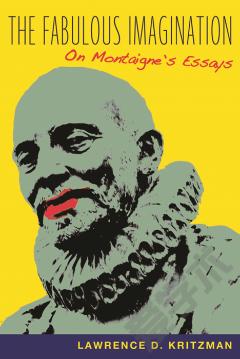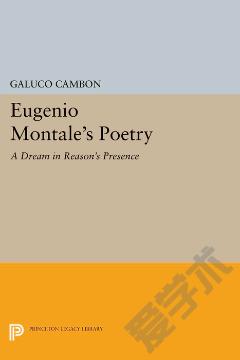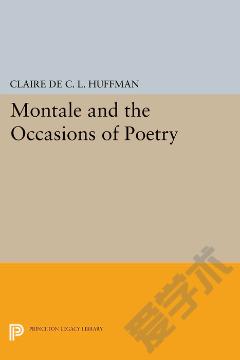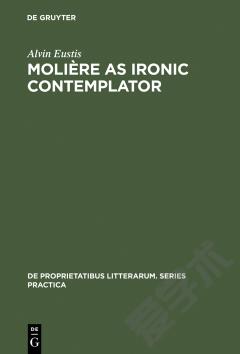
康奈尔大学
The Fabulous Imagination —— On Montaigne's Essays
----- 梦幻般的想象力:蒙田的随笔
ISBN: 9780231512510 出版年:2009 页码:240 Kritzman, Lawrence Columbia University Press
AcknowledgmentsIntroduction: Montaigne Is TheoryPart I. Monster Theory1. Montaigne's Fantastic Monsters and the Construction of Gender2. Representing the Monster: Cognition, Cripples, and Other Limp Parts in "Des boyteux" (III, 11)Part II. Death Sentences3. Montaigne's Fraternity: La Bo tie on Trial4. Montaigne on Horseback, or the Simulation of Death5. The Anxiety of Death: Narrative and Subjectivity in "De la diversion" (III, 4)6. Excavating Montaigne: The Essayist on TrialPart III. Philosophical Impostures7. The Socratic Makeover: The Ethics of the Impossible in "De la phisionomie" (III, 12)8. Romancing the Stone: "De l'experience" (III, 13)NotesWorks CitedIndex
Lawrence Kritzman's Fabulous Imagination: On Montaigne's Essays reminds us that theory is, first and foremost, an eye for the particular, a passion for difference and strangeness. Theory blocks the impulse to synthesize or homogenize, asking us constantly to imagine otherwise. Kritzman practices theory at its best. Psychoanalytic and deconstructive notions are never deployed as ends in themselves, but are put into play to prolong and enrich our engagement with Montaigne's work. Taming or foreclosing the Essays' textual energy is indeed anathema to Kritzman's approach. Rather, attentiveness to Montaigne's psychoanalytic register translates as an appreciation of Montaigne's singular struggles with self-representation, death, and the processes of mourning. In Kritzman's skillful hands, Montaigne emerges as an enigmatic signifier, a self-conscious writer exposed to the vulnerability of both existence and interpretation. As Kritzman aptly puts it: "For Montaigne, philosophy is an impossible engagement since he views thought as a destabilizing agent that is open to constant revision. The essayist doubts the possibility of attaining closure in the act of interpretation. . . . The consequences of this phenomenon, in the quest for self-knowledge, suggest that Montaigne must theorize the human subject at the limit of the theorizable" (2). Kritzman's Montaigne becomes, we could say, a theorist avant la lettre. Philosophy's classic questions--What do I know? What kind of being am I? What is the good life?--are all met with unexpected and unsettling answers. Montaigne's identity reveals itself to be a thing of this world--born out of the trauma of loss (haunted by the death of his cherished friend, La Boétie), interwoven with concerns for gender (the performance of a fragile masculinity), and precariously enabled and reconfigured by the curative workings of the imagination. Kritzman's book comes at a crucial time in Montaigne scholarship when historical contextualization dominates the reception of the Essays. Yet without rehashing old--if not exhausted--debates, Kritzman's intervention amounts to a breath of fresh air, a renewed contact with Montaigne's singularity. Simultaneously welcoming and demanding, Kritzman's Fabulous Imagination will appeal both to new readers of Montaigne--especially those who are joyfully perplexed by the essayist's uncanny and aporetic prose--and to the most seasoned of readers who hunger for more, who continue to be fascinated by the Montaigne's textual indocility and fantastic imagination.
The theory may be brilliant, but the writing is certainly not.
Lawrence Kritzman combines the talents of a literary critic and a Renaissance scholar in a refreshingly original and energetic study of Montaigne's Essais. He masterfully conjoins contemporary philosophy and psychoanalytic theory with philology and history. He explicates the spectacular presentation of Montaigne's dynamic self as the production of a fabulous imagination in search of both its self and a cure for the dilemmas of the human condition. From the brilliant equation of philosophy and more specifically theory with theatricality, Kritzman makes of the contemplative "I" that is Montaigne the source of many imagined--literally, visualized--selves. He understands that in the Essais consciousness of being is primed by seeing the self: I see, therefore I am. Montaigne's self-portraiture is thus constituted by a rhetoric of the visual. Since Montaigne writes about an ever elusive and renewing self, his reader is continuously led to other theoretical performances of the essayist's self-reflexive play. The body of Kritzman's book analyzes these varied performances. Part One: Monster Theory. In "Montaigne's Fantastic Monsters and the Construction of Gender" (Ch. 1), Kritzman explains how Montaigne recognizes the stranger that he is and how the essayist attempts through writing to gain mastery of his monstrously multiple selves embedded in his imagination. Specifically, in the story of Marie-Germain, Kritzman shows how gender identity for Montaigne can be a mental construction; the mind "miraculously generate[s] sex changes," and Marie becomes Germain. This story illustrates the fantastic power of the imagination, both Montaigne's and others', in engendering another and to be sure monstrous self. Moreover, Kritzman weaves into his analyses of monsters the critical relationship between potency and the unbridled imagination. "Representing the Monster" (Ch. 2) is a carefully crafted study of Montaigne's "Of cripples." On the one hand, Kritzman relates human reason to the image of a cripple, defective in its ability to distinguish truth from artificial contrivances of causality. Not recognizing its own impairment, reason arrogantly defines what is natural from what is not and paradoxically produces monstrous speculations. The things that reason sees as miraculous--supernatural wonderments which mankind understands as being beyond human grasp--are simply a result of reason's self-deceiving vanity, because as Kritzman writes, "the monstrous [or the miraculous] is but a manifestation of the diversity within nature itself." On the other hand, Kritzman shows how Montaigne refers to the image of the cripple in the Martin Guerre story to advance a "de-phallicized approach to knowledge." By this, Kritzman equates the revelation of truth by the lame Martin Guerre as posing a challenge to "the dominant fiction put forth in the name of the father." Part Two: Death Sentences. In "Montaigne's Fraternity: La Boétie on Trial" (Ch. 3), Kritzman offers a powerful revisionary interpretation of Montaigne's relationship with Etienne de la Boétie. While received scholarship has focused on the fraternal bond, one without difference, between the two men, Kritzman demonstrates how Montaigne, while memorializing his friend, shifts from a brother to a father figure, who "puts the friend on trial." Formulating in writing a judgment about La Boétie and the latter's La Servitude Volontaire, Montaigne hesitates between supporting and questioning the integrity of his deceased friend. This ambivalence, overlooked by critics, causes the essayist to emerge from his text distinct from someone whom he once named his other self. "Montaigne on Horseback, or the Simulation of Death" (Ch. 4) presents an elucidating reading of Montaigne's complex essay, "Of practice." The essay tells of Montaigne's near-death experience, when he was thrown from his horse, and this story of his fall reveals Montaigne's more pressing desire and need to experiment with death. From this event, Montaigne attempts to grasp the ungraspable, to essay the unknowable, and consequently to remove from death any fear or pain. Kritzman cogently argues how Montaigne generates a fiction about his near-death experience "to transpose death to a locus of pleasure, converting it into a malleable phenomenon." "Montaigne's Death Sentences: Narrative and Subjectivity in `De la diversion' (III, 4)" (Ch. 5) is a careful and helpful reading of Montaigne's "Of diversion"; it showcases the refined skills of a literary critic steeped in psychoanalytic theory. The chapter addresses how humans turn themselves away "from the anxiety produced by the fear of death." Kritzman outlines the rhetorical processes underlying Montaigne's discussion of diversion in psychoanalytic terms, and he does so superbly. He makes evident for the reader Montaigne's dramatization of a psychology of displacement--the essayist's working out of his anxiety. Because death reveals to humankind the emptiness of life, Kritzman explains nonetheless how "that loss can be transformed into a creative productivity that is paradoxically based on the vanity of life." That creative process is none other than a function of psychological displacement. In 1595, Montaigne's literary executor, Marie de Gournay, the woman called--rather imaginatively--his "fille d'alliance" ("covenant daughter"), prepared for publication a posthumous edition of the Essais based on Montaigne's 1588 handwritten addenda to the text. She accompanied that 1595 edition with her own preface. The relationship among Gournay, Montaigne, and the Essais is the subject of "Excavating Montaigne: The Essayist on Trial" (Ch. 6). Kritzman explicates the rather intricate "family romance" that is created by Montaigne's naming Gournay as his daughter. The metaphorical notion of fathership (Montaigne's and eventually Gournay's as executor) and its legitimation of Gournay's identity and voice is very well played out here and causes for reflection on female identity not only in relation to Montaigne and the Essais but also in the larger context of the sixteenth century. Part Three: Philosophical Impostures. "The Socratic Makeover: Montaigne's `De la physionomie' and the Ethics of the Impossible" (Ch. 7) presents a highly original and persuasive reading of one of Montaigne's best-known essays. Kritzman uses Montaigne's discussion of Socrates to get at what it means, for Montaigne, to exist and to follow nature. A discussion of the physiognomy of Socrates leads to that of the essayist. Unlike Socrates, who is condemned to death, by taking a moral action deemed to be consonant with his nature, Montaigne, confronted also by the threat of death, masks his fear with a look expressing "natural" courage. By adhering to moral purity, Socrates acts paradoxically immoderately and allows himself to die, whereas Montaigne will not yield to excessive moral rigor and therefore will live. Socrates sacrificed human balance for philosophical ideals, while Montaigne held to his, which was founded on common morals. In so doing, Montaigne appears, for Kritzman, closer to human nature and offers himself a moral example counter to the exemplarity of Socrates. "Romancing the Stone" (Ch. 8) is a poignant conclusion to a book on Montaigne's imagination, for it summarizes the central lessons of the Essais. Identity, for Montaigne, is neither given nor essential; the self, varied, fragmented, and instantaneous, finds its only expression or mediation in the rhetorical dynamics of the imagination. What for most scholars are signs of oneness and plenitude in Montaigne is for Kritzman markers of difference and alterity--in other words, of "an aporetic self." In this chapter, Kritzman reads Montaigne's "Of experience," as a self-revealing exercise, by which the essayist presents the reader with the "tropological representations of [his] body and a taxonomy of the highly personal yet banal aspects of everyday life." The irony is that the more we see, the less we know. Montaigne's chronic kidney stones, a condition inherited from his father and hence symbolic "traces of the Father", serve as a critical example of the problematic "ontological status of what is known." Nonetheless, Montaigne's drama of corporeal pain and disintegration gives birth to a fabulous imagination, a narration not only about suffering but also pleasure and human desire through which the life of the self is continually reinvigorated. Kritzman's study makes it eminently clear why we read Montaigne today.
What would Montaigne have made of this sentence (p74): "Moreover, Montaigne's encryption of La Boetie's discourse into his own demonstrates how a textural metamorphosis can reveal the way in which the psychic and the social intermingle to produce symbolic representations derived from tropes of nourishment and communion." I suspect not much. This sentence is a typical slice of academic self-pleasuring intended to shared with fellow academics, not with human beings.
Kritzman's book is the perfect book for the theoretically-inclined student or scholar of the essayist. It combines, seamlessly and effortlessly, theory and text and establishes a Model of scholarship. A pleasing, flowing style not unlike Montaignes own. I read with pleasure.
C'est un très bon outil de travail pour les chercheurs et les enseignants. Papier de bonne qualité. Le prix est raisonnable.
Lawrence Kritzman's Fabulous Imagination: On Montaigne's Essays reminds us that theory is, first and foremost, an eye for the particular, a passion for difference and strangeness. Theory blocks the impulse to synthesize or homogenize, asking us constantly to imagine otherwise. Kritzman practices theory at its best. Psychoanalytic and deconstructive notions are never deployed as ends in themselves, but are put into play to prolong and enrich our engagement with Montaigne's work. Taming or foreclosing the Essays' textual energy is indeed anathema to Kritzman's approach. Rather, attentiveness to Montaigne's psychoanalytic register translates as an appreciation of Montaigne's singular struggles with self-representation, death, and the processes of mourning.In Kritzman's skillful hands, Montaigne emerges as an enigmatic signifier, a self-conscious writer exposed to the vulnerability of both existence and interpretation. As Kritzman aptly puts it: "For Montaigne, philosophy is an impossible engagement since he views thought as a destabilizing agent that is open to constant revision. The essayist doubts the possibility of attaining closure in the act of interpretation. . . . The consequences of this phenomenon, in the quest for self-knowledge, suggest that Montaigne must theorize the human subject at the limit of the theorizable" (2). Kritzman's Montaigne becomes, we could say, a theorist avant la lettre. Philosophy's classic questions--What do I know? What kind of being am I? What is the good life?--are all met with unexpected and unsettling answers. Montaigne's identity reveals itself to be a thing of this world--born out of the trauma of loss (haunted by the death of his cherished friend, La Boétie), interwoven with concerns for gender (the performance of a fragile masculinity), and precariously enabled and reconfigured by the curative workings of the imagination.Kritzman's book comes at a crucial time in Montaigne scholarship when historical contextualization dominates the reception of the Essays. Yet without rehashing old--if not exhausted--debates, Kritzman's intervention amounts to a breath of fresh air, a renewed contact with Montaigne's singularity. Simultaneously welcoming and demanding, Kritzman's Fabulous Imagination will appeal both to new readers of Montaigne--especially those who are joyfully perplexed by the essayist's uncanny and aporetic prose--and to the most seasoned of readers who hunger for more, who continue to be fascinated by the Montaigne's textual indocility and fantastic imagination.
Lawrence Kritzman combines the talents of a literary critic and a Renaissance scholar in a refreshingly original and energetic study of Montaigne's Essais. He masterfully conjoins contemporary philosophy and psychoanalytic theory with philology and history. He explicates the spectacular presentation of Montaigne's dynamic self as the production of a fabulous imagination in search of both its self and a cure for the dilemmas of the human condition. From the brilliant equation of philosophy and more specifically theory with theatricality, Kritzman makes of the contemplative "I" that is Montaigne the source of many imagined--literally, visualized--selves. He understands that in the Essais consciousness of being is primed by seeing the self: I see, therefore I am. Montaigne's self-portraiture is thus constituted by a rhetoric of the visual. Since Montaigne writes about an ever elusive and renewing self, his reader is continuously led to other theoretical performances of the essayist's self-reflexive play. The body of Kritzman's book analyzes these varied performances. Part One: Monster Theory. In "Montaigne's Fantastic Monsters and the Construction of Gender" (Ch. 1), Kritzman explains how Montaigne recognizes the stranger that he is and how the essayist attempts through writing to gain mastery of his monstrously multiple selves embedded in his imagination. Specifically, in the story of Marie-Germain, Kritzman shows how gender identity for Montaigne can be a mental construction; the mind "miraculously generate[s] sex changes," and Marie becomes Germain. This story illustrates the fantastic power of the imagination, both Montaigne's and others', in engendering another and to be sure monstrous self. Moreover, Kritzman weaves into his analyses of monsters the critical relationship between potency and the unbridled imagination. "Representing the Monster" (Ch. 2) is a carefully crafted study of Montaigne's "Of cripples." On the one hand, Kritzman relates human reason to the image of a cripple, defective in its ability to distinguish truth from artificial contrivances of causality. Not recognizing its own impairment, reason arrogantly defines what is natural from what is not and paradoxically produces monstrous speculations. The things that reason sees as miraculous--supernatural wonderments which mankind understands as being beyond human grasp--are simply a result of reason's self-deceiving vanity, because as Kritzman writes, "the monstrous [or the miraculous] is but a manifestation of the diversity within nature itself." On the other hand, Kritzman shows how Montaigne refers to the image of the cripple in the Martin Guerre story to advance a "de-phallicized approach to knowledge." By this, Kritzman equates the revelation of truth by the lame Martin Guerre as posing a challenge to "the dominant fiction put forth in the name of the father." Part Two: Death Sentences. In "Montaigne's Fraternity: La Boétie on Trial" (Ch. 3), Kritzman offers a powerful revisionary interpretation of Montaigne's relationship with Etienne de la Boétie. While received scholarship has focused on the fraternal bond, one without difference, between the two men, Kritzman demonstrates how Montaigne, while memorializing his friend, shifts from a brother to a father figure, who "puts the friend on trial." Formulating in writing a judgment about La Boétie and the latter's La Servitude Volontaire, Montaigne hesitates between supporting and questioning the integrity of his deceased friend. This ambivalence, overlooked by critics, causes the essayist to emerge from his text distinct from someone whom he once named his other self. "Montaigne on Horseback, or the Simulation of Death" (Ch. 4) presents an elucidating reading of Montaigne's complex essay, "Of practice." The essay tells of Montaigne's near-death experience, when he was thrown from his horse, and this story of his fall reveals Montaigne's more pressing desire and need to experiment with death. From this event, Montaigne attempts to grasp the ungraspable, to essay the unknowable, and consequently to remove from death any fear or pain. Kritzman cogently argues how Montaigne generates a fiction about his near-death experience "to transpose death to a locus of pleasure, converting it into a malleable phenomenon." "Montaigne's Death Sentences: Narrative and Subjectivity in `De la diversion' (III, 4)" (Ch. 5) is a careful and helpful reading of Montaigne's "Of diversion"; it showcases the refined skills of a literary critic steeped in psychoanalytic theory. The chapter addresses how humans turn themselves away "from the anxiety produced by the fear of death." Kritzman outlines the rhetorical processes underlying Montaigne's discussion of diversion in psychoanalytic terms, and he does so superbly. He makes evident for the reader Montaigne's dramatization of a psychology of displacement--the essayist's working out of his anxiety. Because death reveals to humankind the emptiness of life, Kritzman explains nonetheless how "that loss can be transformed into a creative productivity that is paradoxically based on the vanity of life." That creative process is none other than a function of psychological displacement. In 1595, Montaigne's literary executor, Marie de Gournay, the woman called--rather imaginatively--his "fille d'alliance" ("covenant daughter"), prepared for publication a posthumous edition of the Essais based on Montaigne's 1588 handwritten addenda to the text. She accompanied that 1595 edition with her own preface. The relationship among Gournay, Montaigne, and the Essais is the subject of "Excavating Montaigne: The Essayist on Trial" (Ch. 6). Kritzman explicates the rather intricate "family romance" that is created by Montaigne's naming Gournay as his daughter. The metaphorical notion of fathership (Montaigne's and eventually Gournay's as executor) and its legitimation of Gournay's identity and voice is very well played out here and causes for reflection on female identity not only in relation to Montaigne and the Essais but also in the larger context of the sixteenth century. Part Three: Philosophical Impostures. "The Socratic Makeover: Montaigne's `De la physionomie' and the Ethics of the Impossible" (Ch. 7) presents a highly original and persuasive reading of one of Montaigne's best-known essays. Kritzman uses Montaigne's discussion of Socrates to get at what it means, for Montaigne, to exist and to follow nature. A discussion of the physiognomy of Socrates leads to that of the essayist. Unlike Socrates, who is condemned to death, by taking a moral action deemed to be consonant with his nature, Montaigne, confronted also by the threat of death, masks his fear with a look expressing "natural" courage. By adhering to moral purity, Socrates acts paradoxically immoderately and allows himself to die, whereas Montaigne will not yield to excessive moral rigor and therefore will live. Socrates sacrificed human balance for philosophical ideals, while Montaigne held to his, which was founded on common morals. In so doing, Montaigne appears, for Kritzman, closer to human nature and offers himself a moral example counter to the exemplarity of Socrates. "Romancing the Stone" (Ch. 8) is a poignant conclusion to a book on Montaigne's imagination, for it summarizes the central lessons of the Essais. Identity, for Montaigne, is neither given nor essential; the self, varied, fragmented, and instantaneous, finds its only expression or mediation in the rhetorical dynamics of the imagination. What for most scholars are signs of oneness and plenitude in Montaigne is for Kritzman markers of difference and alterity--in other words, of "an aporetic self." In this chapter, Kritzman reads Montaigne's "Of experience," as a self-revealing exercise, by which the essayist presents the reader with the "tropological representations of [his] body and a taxonomy of the highly personal yet banal aspects of everyday life." The irony is that the more we see, the less we know. Montaigne's chronic kidney stones, a condition inherited from his father and hence symbolic "traces of the Father", serve as a critical example of the problematic "ontological status of what is known." Nonetheless, Montaigne's drama of corporeal pain and disintegration gives birth to a fabulous imagination, a narration not only about suffering but also pleasure and human desire through which the life of the self is continually reinvigorated. Kritzman's study makes it eminently clear why we read Montaigne today.
What would Montaigne have made of this sentence (p74):"Moreover, Montaigne's encryption of La Boetie's discourse into his own demonstrates how a textural metamorphosis can reveal the way in which the psychic and the social intermingle to produce symbolic representations derived from tropes of nourishment and communion."I suspect not much.This sentence is a typical slice of academic self-pleasuring intended to shared with fellow academics, not with human beings.

隐私声明 | 电子书 | 出版社
主办单位:中国教育图书进出口有限公司
京ICP备11007853号-12  京公网安备 11010802027623号
京公网安备 11010802027623号
Copyright ©爱学术平台 2021, All Rights Reserved






